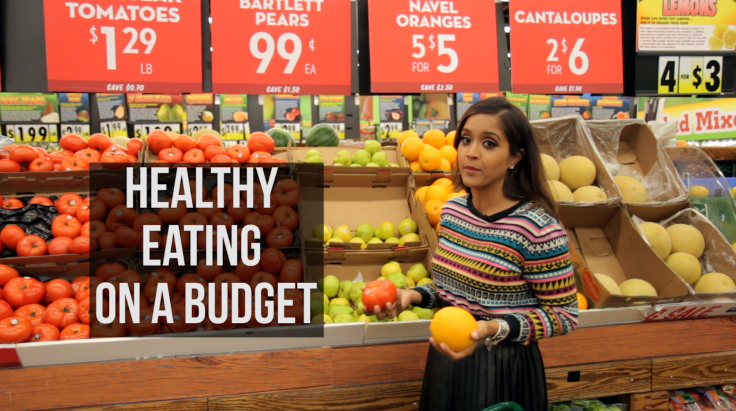Healthy Eating On A Budget: Money-Saving Tips To Cut Your Food Spending

Eating healthy can seem like a daunting chore. Some people believe that it is much easier to get fast food, eat out, or just buy quick-fix dinners. Not only can these choices end up being very costly, they can also lead to an unhealthy lifestyle. This could be a significant factor in the constantly rising obesity rate, which hit 34.9 percent of Americans in September 2015, an all-time high. Some experts have even said that people in this generation will be the first to live shorter lives than their parents because of this unhealthy lifestyle.
According to a 2012 Gallup poll, the average American spends $151 on food each week, including groceries and eating out. This adds up over time and can burn a hole in your wallet. So instead of trying to save money by shopping off of the dollar menu at McDonald’s, try these easy and useful tips we've compiled to help you save money at the grocery store instead.
Buy From The Bulk Section
Buy grains, nuts, and legumes from the bulk section. “This can be a lot cheaper and you’ll only get exactly what you need,” Marci Clow, a registered dietitian and senior nutritionist at vitamin company Rainbow Light, told Medical Daily. She also suggests putting them in the freezer since they have oils in them and can go rancid over time.
Shop For In-Season Produce
Fruits and vegetables get cheaper when they’re plentiful. Shop for ones that are in season in your area. Use the Unites States Department of Agriculture’s seasonal produce guide site to find out what’s available.
Prepare Big Meals For Throughout the Week
Unprocessed foods can take longer to cook, but you can save time and make them easier to eat by preparing a large batch all at once in the beginning of the week, Clow recommends. “If you make something like a big pot of soup, you can have it at hand throughout the week.” she said.
Shop On A Full Stomach
The age-old tip to shop on a full stomach is actually true. According to a 2013 JAMA study, hungry shoppers ended up buying more calories, not more food. Shop when you’re full, this way you won’t be tempted to throw random things in your cart.
Discover Other Protein Sources
In our culture, people view meat as the main source of protein, but there are many other ways to get your daily recommended amount. Beans, nuts, and legumes can be inexpensive and cost-efficient. For example, a person can get more than 28.5 grams of protein from 1 cup of boiled soybeans. However, there are two types of proteins: complete and incomplete. Unlike meat, eggs, and dairy, a can of beans will not give you complete protein. To round out protein from purely vegetarian sources, combine different types of beans, legumes, or grains.
Write A Grocery List And Set Aside A Budget
Before you head out to the store, make sure you write down a list and set aside a dollar amount that you’d like to spend. This way you will have to be mindful of your budget and you won’t accidentally overspend.
With these tips and a little preparation, you can significantly cut down your grocery bill — your wallet and your waistline will thank you.



























